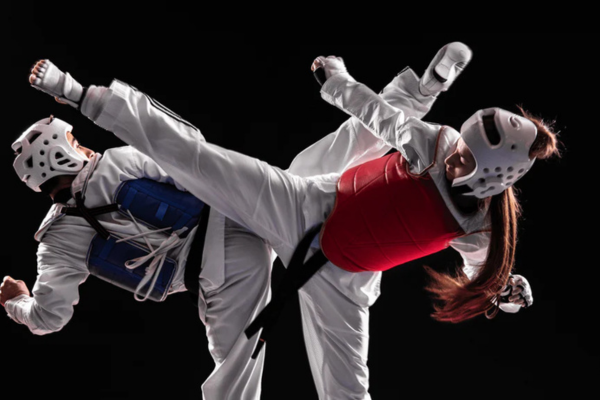Karate vs. Taekwondo: Discover the differences and unique benefits

 Karate and Taekwondo are beloved martial arts worldwide. At first glance they may seem similar, but there are major differences in technique, philosophy, and training. Want to start martial arts and can’t decide between the two? Read on and discover which style suits you best. At Fightstyle.nl you’ll find the right gear for both disciplines. Want to know more about global martial arts styles? Check out the World Martial Arts Encyclopedia.
Karate and Taekwondo are beloved martial arts worldwide. At first glance they may seem similar, but there are major differences in technique, philosophy, and training. Want to start martial arts and can’t decide between the two? Read on and discover which style suits you best. At Fightstyle.nl you’ll find the right gear for both disciplines. Want to know more about global martial arts styles? Check out the World Martial Arts Encyclopedia.
History and Origin
Karate originates from Okinawa and was heavily influenced by Chinese fighting techniques. It means “empty hand” and focuses on unarmed defense. In the 20th century, karate was brought to mainland Japan and further developed. Taekwondo was born in Korea after World War II. This modern sport combines traditional Korean styles with influences from other martial arts. It became an Olympic discipline in 2000. Whether you choose a traditional style like karate or are drawn to Taekwondo’s modern flair, at Fightstyle you have access to high-quality training products. Read more about the official history of Taekwondo.
Techniques and Style
Karate revolves around precise, powerful techniques such as strikes, kicks, and blocks. Examples include the gyaku-zuki (reverse punch) and mae-geri (front kick). Taekwondo, on the other hand, emphasizes high and fast kicks, with techniques like dollyo-chagi (roundhouse kick) and ap-chagi (front kick). Both styles require discipline, but the dynamics differ significantly. Use the proper gear—such as kicking shields and shin guards—tailored to your chosen style. Learn more about these techniques on Taekwondo Wiki.
Training Methods: Karate vs. Taekwondo
Karate focuses on kihon (basic techniques), kata (forms), and kumite (sparring). These components help develop technical mastery and mental focus. Taekwondo training sessions emphasize poomsae (forms), sparring with protective gear, and intensive conditioning. Both disciplines enhance coordination, strength, and reaction time. Whichever approach you choose, at Fightstyle.nl you’ll find training equipment for every level. Want tips on training structure? Check out this training guide.
Self-Defense and Effectiveness
Karate strongly emphasizes effective self-defense techniques, with strikes and kicks that are quick and targeted. The use of the environment and control techniques are also important. Taekwondo offers rapid, powerful kicks that keep an attacker at distance. Both styles train body and mind, increasing your resilience. Choose the right protective gear for safe training. Read more about self-defense techniques on Self Defense Central.
Pros and Cons of Both Sports
 Karate offers a broad approach with attention to physical and mental growth. It’s suitable for all ages and emphasizes discipline. Taekwondo is athletic and dynamic, with spectacular kicks and an Olympic future. You train not only your strength but also flexibility and endurance. Whichever sport you choose, the right karate or taekwondo uniform supports your growth. Want to compete? Explore opportunities through the Taekwondo Bond Nederland.
Karate offers a broad approach with attention to physical and mental growth. It’s suitable for all ages and emphasizes discipline. Taekwondo is athletic and dynamic, with spectacular kicks and an Olympic future. You train not only your strength but also flexibility and endurance. Whichever sport you choose, the right karate or taekwondo uniform supports your growth. Want to compete? Explore opportunities through the Taekwondo Bond Nederland.
Begin Your Martial Arts Adventure
Both karate and taekwondo demand commitment but offer great benefits: physical strength, mental focus, and self-confidence. Whichever style you choose, ensure you have quality gear and a good training environment. At Fightstyle you’ll find gloves, uniforms, protective gear, and accessories for every fighter—from beginner to pro. Become part of the Fightstyle Family today and discover how martial arts can enrich your life!
 Nederlands
Nederlands English
English Deutsch
Deutsch Français
Français


Goed blog leest makkelijk weg, vooral het verschil tussen karate en taekwondo vond ik interessant,. Welke van de twee zou je aanraden voor iemand die vooral iets zoekt op het gebied van zelfverdediging?
Leave a comment